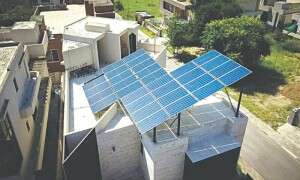LAHORE: A seminar emphasised the urgent need for industrial decarbonisation in Pakistan, particularly in the textile and sports sectors, to align with global sustainability goals. The event, titled “Arresting the Effects of Climate Change: Pakistan’s Industrial Sector - Emissions Assessment and Way Forward,” was held at a hotel in Multan.
Dr Shahooduz Zaman from Faisalabad National Textile University said that despite contributing 55-60% of Pakistan’s exports, the textile sector’s reliance on fossil fuels hampers global competitiveness.
“The average CO2 emissions in the textile industry stand at 25.9 tonnes per month per industry. By scaling up solar energy use, emissions could be cut down by up to 9.2 tonnes of CO2 per month,” Dr Shahood explained, stressing that sustainable energy is essential for global success.
He further recommended the government provide a policy framework and raise awareness within the industrial community to accelerate decarbonisation efforts.
Experts discussed the challenges of transitioning to renewable energy, emphasising the importance of reducing carbon emissions and adopting climate-friendly technologies.
Dr Muhammad Dawood of BZU explained that industrialisation significantly contributes to the ecological footprint of various countries and shared strategies for industrial decarbonisation. “Our textile sector is facing a 15% drop in export potential due to high energy costs and CO2 emissions.
Transitioning to renewable energy is essential for growth and success,” he said.
Dr Muhammad Sultan, also from BZU, pointed out the importance of industrial decarbonisation in protecting agriculture, especially in regions like Multan, where a cleaner industrial sector ensures sustainable agricultural productivity.
Industry representatives M Hussain Khawaja and Aasim Shah provided insights into the energy consumption patterns of the textile industry in Multan. They highlighted the potential for renewable energy integration and the implications of the upcoming Carbon Border Adjustment Mechanism. They emphasised that Pakistan’s export potential would remain limited unless energy costs are reduced to match regional competitors like India, Vietnam and Bangladesh.
Published in Dawn, September 7th, 2024











































